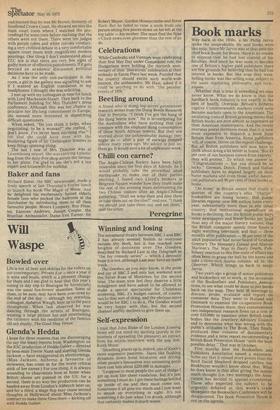Book marks
Way back in the 1950s, a Mr Philip Jarvis spoke the unspeakable. He said books were like soap, Since Mr Jarvis was at that time the chief book buyer for Boots, there is no reason to suppose that he had lost control of his faculties. And since he was soon to become one of Britain's higher paid publishers there are few grounds for believing that he had lost interest in books. But like soap they were. Selling books was like selling soap, subject to the same marketing philosophy and techniques.
Whether that is true is something we may never know. What we do know is that the hardback book industry is not exactly in the best of health. Overseas, Britain's hitherto captive Commonwealth markets could soon become markets open to the Americans. The escalating costs of British printing means that British books are now almost as expensive as their American counterparts. And the recent overseas postal increases mean that it is now more expensive to dispatch a book from Britain than from America. Some publishers will, of course, thrive on the export challenge. But all British publishers will now have to think about doing a bit better at home. "But 43 per cent of our business comes from exports" they will protest." To which one answer is: "Congratulations — but you should be so lucky." German, Dutch, French and Italian publishers have to depend largely on their home markets and even those awful American publishers sell 90 per cent of their books at home.
"At home" in Britain means that nearly a quarter of the country's elite "charter" booksellers are losing money; that public libraries register over 600 million loans every year, substantially more than in any other country; that institutional expenditure on books is declining; that the British public buys more newspapers and fewer books per head than any of the major literary nations; that the British consumer spends three hours a night watching television; and that — three • months after publication — 98 per cent of the adult population had never heard of Graham Greene's The Honorary Consul and Alastair
Maclean's The Way to Dusty Death. Pub
lishers' reaction to this fine state of affairs has often been to grasp the bull by the horns and take a three-inch double column ad in the Observer. Which brings us back to soapy Jarvis.
Two years ago a group of senior publishers and booksellers set to work, at the invitation of the Booksellers and Publishers Assoca tions, to see what could be done to put books back on the map. They held 36 meetings to discuss, probe, evaluate and report on consumer data. They went to Holland and Denmark to examine the co-operative Book Promotion Houses there; they commissioned two independant research firms (at a cost of over £10,000) to examine other British trade bodies like the Jewellery Advisory Council and to determine what was wrong with the public's attitudes to The Book. They finally produced nine volumes of documentary evidence and a terse report recommending a British Book Promotion House "with the least possible delay." That was in October. Five months later the Booksellers and Publishers Association issued a statement. Some say that it missed more points than the Revd David Shepherd dropped catches, but Bookbuyer wouldn't know about that. What he does know is that after giving the matter much thought (i.e. two meetings) the Association has decided to appoint a committee. Those who expected the subject to be urgently debated at this week's trade showpiece the Booksellers Conference will be disappointed. The Book Promotion House is not on the agenda.










































 Previous page
Previous page